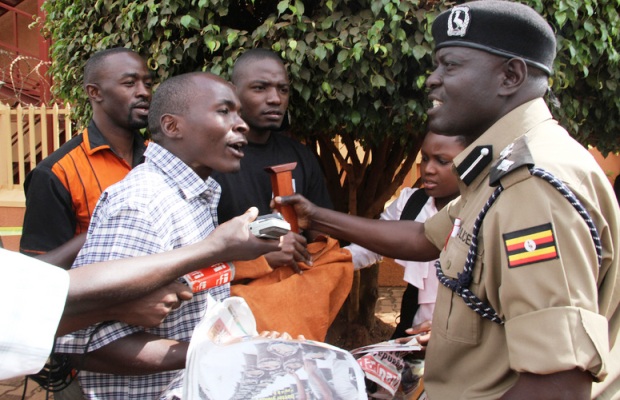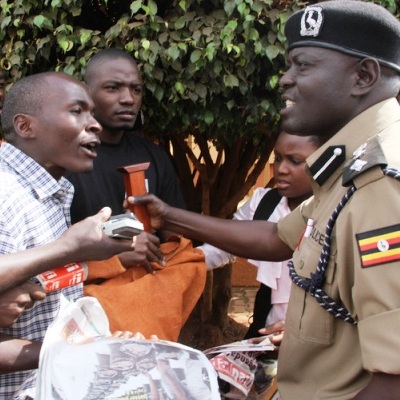
In June 2013, police and protesters clashed at the offices of the Daily Monitor, Kampala. Picture Isaac Kasamani/Demotix
In the age of technology with high-speed Internet access and smart phones, it is sometimes easy to imagine that all journalists’ working lives are the same: deadlines, insufficient resources, worrying about the threats of digital media and the race to break news.
In some ways these concerns are indeed universal. However, what journalists in North America and Europe hardly ever have to worry about is their basic right to report the news. It is true that in a post-Wikileaks and News of the World journalistic environment, all reporters have had to consider their fundamental role in providing news and information and analysis ethically. However, in Africa many journalists find themselves carefully tiptoeing through minefields of media laws which limit their ability to report accurately and truthfully on the news of the day, particularly when reporting on activities of the powerful in government.
Recently in Swaziland, a journalist has been charged with contempt of court for reporting the fundamental issue of whether or not the Chief Justice is fit to hold office, given that he is the subject of impeachment proceedings back in his own country, Lesotho. Several Zambian journalists were brought to court earlier this year, initially accused of sedition. In Ethiopia, journalists are serving time in prison, sentenced for threatening the state with their reports.
Besides individual actions taken against journalists, whole media enterprises are also at risk. In Tanzania, the two newspapers Mwananchi and Mtanzania have been suspended by the unilateral action of the Minister of Information citing breach of the peace concerns – Mwananchi was reporting on new salary structures in the government. Earlier this year, the newsroom of the Ugandan newspaper Daily Monitor was under siege for over a week, while police was trying to find letters that were exchanged between editors and a source.
There is no doubt that much state action against journalists and media houses is unconstitutional. However, there is also no doubt that Africa’s media laws do make provision for draconian action to be taken against journalists and publications.
The Konrad Adenauer Stiftung’s Media Programme has recently published a two-volume Media Law Handbook for Southern Africa, written by Justine Limpitlaw. The handbook is available for free download on the internet. One of the most important aims of the handbook is simply to provide information about what the law is in a number of southern African countries. Statutes are often not available electronically and many journalists simply have no idea about what the laws governing the media are.
A key characteristic of many southern African countries is a media law landscape with a relatively benign liberal constitution at the apex. All constitutions protect freedom of expression to some extent. However, very few changes have been made to media legislation to ensure that the legislation accords with the constitutional right to freedom of expression. Despite oft-expressed anger at the colonial era and its on-going repercussions for the continent, African political elites have essentially retained colonial era media laws as is.
One only has to list many in-force statutes to note that African media law appears to have stultified in the early or mid-20th century. Both Lesotho’s and Swaziland’s Sedition legislation dates back to 1938. Swaziland’s Cinematograph Act is from 1920. Many countries’ Penal Codes date back to the 1960s – prior to their independence from Colonial powers. These Penal Codes criminalise many forms of expression including defamation, insult and false news, and provide for significant jail sentences.
Sadly few attempts have been made to update African media laws. On the rare occasion where a country has engaged in media law reform, the results have been decidedly mixed. South Africa’s attempt to update apartheid-era security laws has been roundly condemned for promoting governmental secrecy at the expense of the public interest.
There is hope. In 2010, the African Commission on Human and People’s Rights adopted Resolution 169 on Repealing Criminal Defamation Laws in Africa. The resolution calls on states parties to repeal criminal defamation and insult laws which impede freedom of speech. In May 2013, the Pan African Parliament adopted the Midrand Declaration on Press Freedom in Africa. The Pan African Parliament resolved to launch a campaign entitled “Press Freedom for Development and Governance: Need for Reform” in all five regions of Africa. These initiatives by intergovernmental African organisations are historic and represent a real opportunity for media law reform. There is also significant pressure being brought to bear on a number of countries to enact access to information laws.
The objective link between a free press and accelerated development is clear. Sadly governments appear all too willing to forego development in their desire to retain political control. Journalists are under real threat in many countries in Africa and the threats are not only from rogue police officers but also from ordinary police officers and other state functionaries merely carrying out the letter of the law.
The Konrad Adenauer Stiftung believes that the media Law handbook could act as a catalyst for bringing together journalists, media owners, members of the judiciary, government officials and media activists to have a serious look at African media law with a view to taking it out of the colonial era. Together with the Pan African Parliament’s and the Comission’s efforts, this is a great opportunity to make Africa a place where journalists can report the news of the day accurately and fairly without fear of arrest and imprisonment.
This article was originally posted on 22 Oct 2013 at indexoncensorship.org





